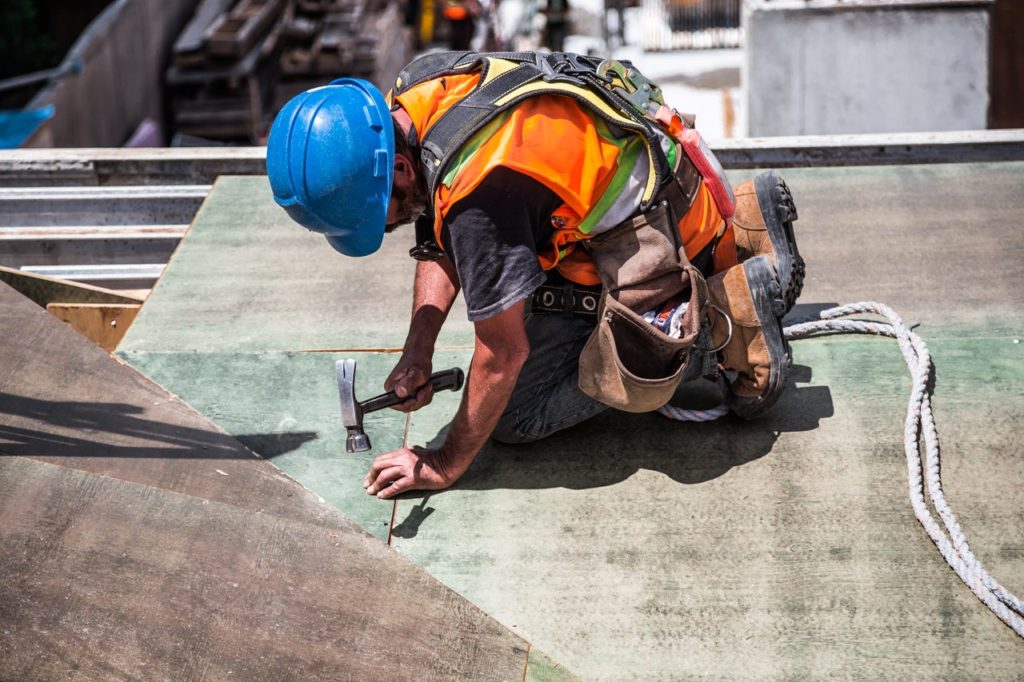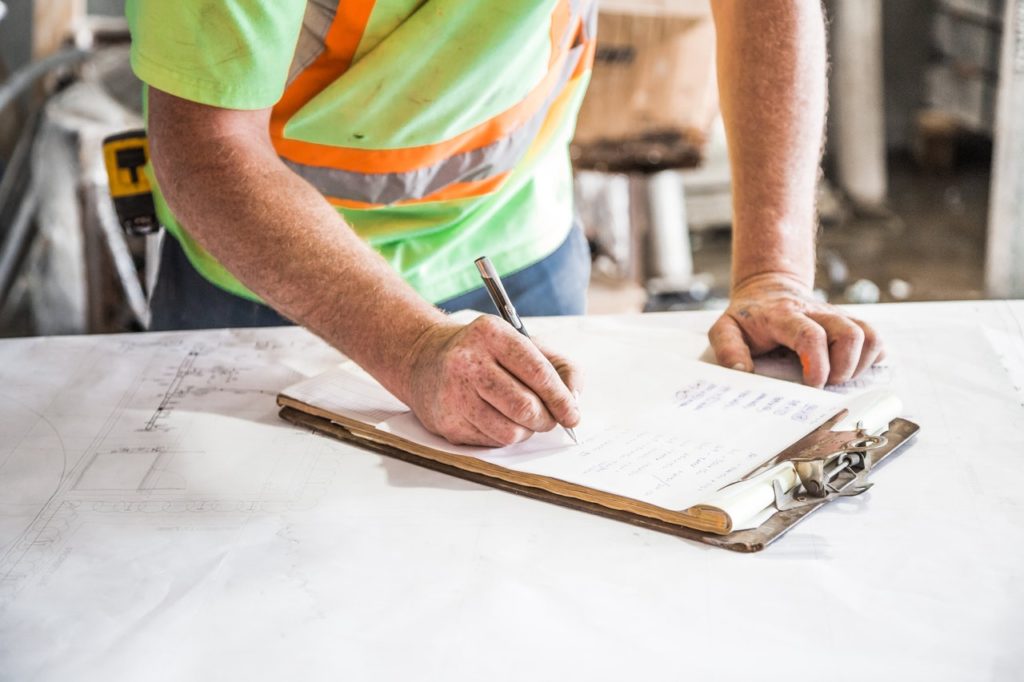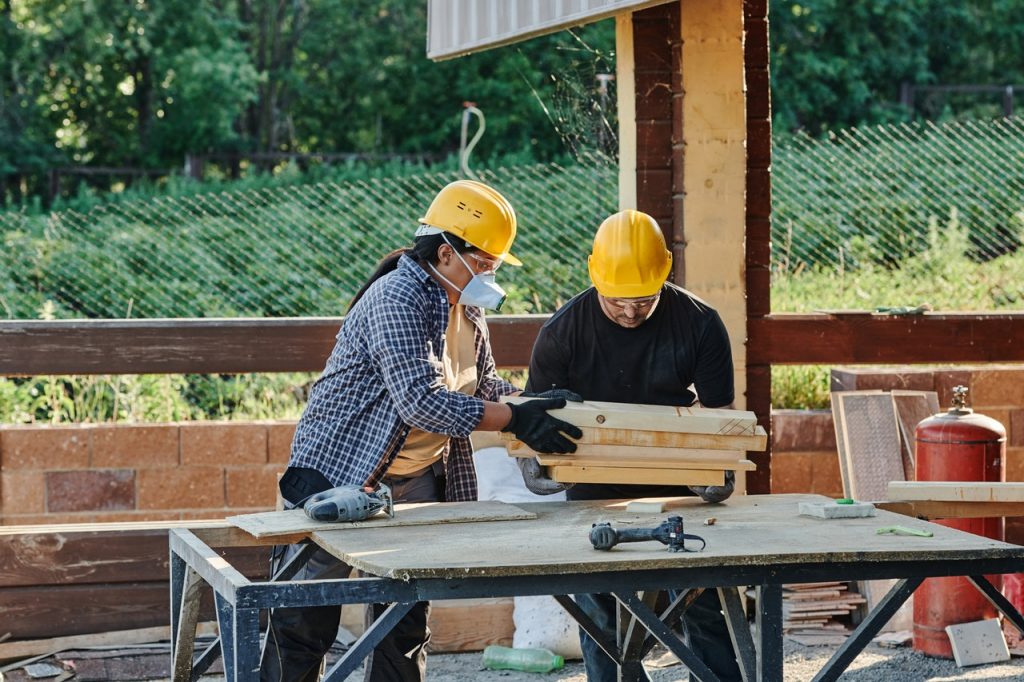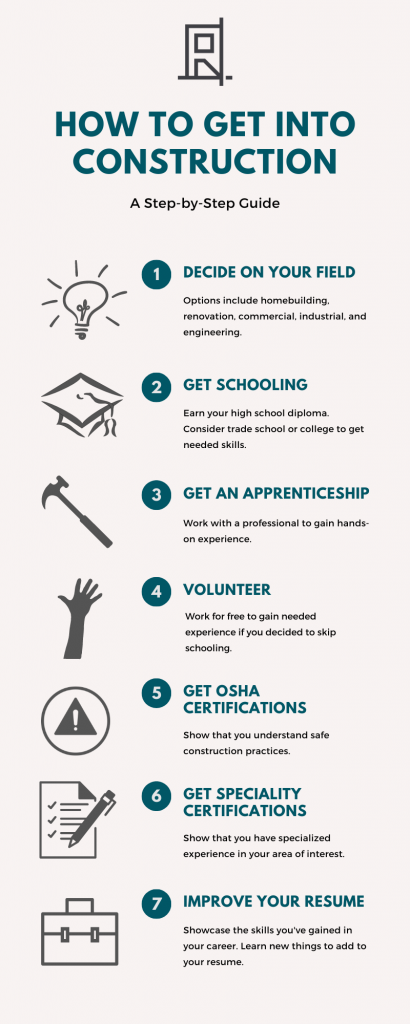
We are reader-supported. When you buy through links on our site, we may earn an affiliate commission.
The construction industry is one of the world’s largest. While it’s faced labor shortages in recent years, it will always be necessary. People need homes, and businesses require structures to support them. Cities demand infrastructure to support their citizens.
To an outside observer, it might seem like the industry is challenging to enter. However, if you like working with your hands and want this career, don’t let the hurdles intimidate you. Here is a step-by-step guide to help you make your dream of working in construction come true.
Jump to our infographic on how to get into construction.
How to get started in construction:
- Decide on your field – homebuilding, commercial, industrial, or engineering
- Get Into Construction Through Education
- Get Into Construction With an Apprenticeship
- How to Get Into Construction Without Experience
- Building Your Career With Certifications
- Building Your Construction Career Resume
Decide On Your Field

There are plenty of routes you can follow in the construction industry. Part of this benefit is the versatility. You can craft your own trajectory and then bring it to fruition. To start down this road, you’ll need to decide which field you want to go into.
This choice won’t be irreversible. You can always change it up down the line. But it should be something you’re passionate about. Here are the main options you can choose from.
Homebuilding and Renovation
On a residential level, construction can make dreams come true. When you work with individuals or families, you’ll build homes or other places of residence. You can also renovate existing homes to match the homeowner’s ideas.
This field is vast, with different types of contractors around every corner. You can specialize in anything you’d like: carpentry, framing, plumbing, HVAC, and more. Overall, homebuilding will always be a relevant and necessary job.
Commercial
If you’re interested in public buildings and structures, then this field is for you. Condos and apartments, libraries, museums, schools and just about every other public building is part of commercial construction.
You’ll be aiding the community in its growth and path forward while developing your own skills and portfolio.
Industrial
Is machinery your thing? Do you love to take a hands-on approach to working with cranes, scaffoldings and cement mixing trucks? This field is where you can go to do just that.
In this construction sector, you’ll be working on structures like nuclear plants, oil refineries and other constructs requiring heavy-duty work. Ultimately, you’ll be pushing local economies forward with whatever you build.
Engineering
Lastly, you can go into a construction field that connects smaller communities to the outside world. By creating bridges, roads and mass transit lines and rails, you’ll be building a location’s infrastructure. In urban areas, especially, you’ll find a significant need for engineering construction workers.
Engineering is a complex field that yields invaluable results. However, the same goes for each of these sectors. Whichever one you go into, you’ll be helping people no matter what.
How to Get into Construction Through Education

The first — and most traditional — path into the construction industry is to build an educational background in construction-related subjects.
High School Diploma
Before you head into any career, you may need to obtain a high school diploma or general equivalency (GED). This stepping stone will make it easier for you to reach your goals later. Taking high school electives like shop, architecture and other construction-adjacent classes can improve your skills. This will prepare you for a hands-on degree.
It’s not always necessary, especially if employers don’t look at your high school transcripts. Still, you’ll acquire valuable skills with these courses. Either way, a diploma or GED should be your first step before you start exploring the rest of your options.
College Degree or Trade School Certification
If you want to head in a different direction, trade school certifications typically entail shorter programs than standard college degrees. Depending on the field you want to get into, your trade school program could last 18 months to four years.
Many occupations in the construction industry, from project management to civil engineering, expect you to earn a college degree before securing a position. Most only require a four-year bachelor’s degree, but you can continue with higher education if you choose. Completing a four-year program and heading into the workforce is a popular choice because many employers will pay you to go back to school for master’s or doctorate programs.
If you decide to go to college, talk to an admissions counselor first. They can guide you on taking steps toward the career you want. Otherwise, a trade school program that teaches a particular specialty might be the best option.
If you want to head in a different direction, trade school certifications typically entail shorter programs than standard college degrees. Depending on the exact field you want to get into, your trade school program could last anywhere from 18 months to four years.
Trade schools give you technical experience for a range of occupations. You can learn the logistics of engineering, or you can work your way towards a construction manager. Once you obtain a diploma or certification, you’ll be much closer to securing a job in that field.
It’s a faster way to start a career than a typical college journey. In the end, you’ll have all the skills you need to secure an entry-level position, plus the hands-on experience to help you succeed.
How to Get Into Construction Through Apprenticeship

Another time-honored way to get into the construction industry is through an apprenticeship. During an apprenticeship, you’ll work for a professional in your chosen trade. You’ll spend the next two years or so learning trade skills in a hands-on environment with an expert guiding you through the tricky parts.
Once you reach a specific skill level as an apprentice, you’ll graduate to the rank of a journeyman. You’ll have more freedom to work unsupervised and start taking on projects. However, you’ll still need to have a professional known as a master of the trade observe and approve your work.
Finally, once you complete your apprenticeship to the trade master’s satisfaction, you’ll earn the rank of master yourself. At this point, you’ll be able to branch out into the construction industry on your own. It takes some time to complete an apprenticeship, but the time spent is worth it for all the hands-on experience you’ll take into the rest of your career.
Getting Into Construction With No Experience
Believe it or not, you don’t need any experience to build a successful construction career. Right now, the United States construction industry employs more than 11.2 million people. That number will continue to grow with demand in the coming decades. Look at any construction site across the country.
Can you tell at a glance who has a degree or a certificate from a technical college? The answer is likely no. Many people start at the bottom in a no-experience-necessary entry-level position and work their way up to a lucrative and productive career.
Without any prior knowledge or experience, you’ll qualify to work in a variety of basic entry-level positions. More specifically, these jobs will fall under the title of laborer, helper or worker — you won’t start in a highly skilled profession.
You should expect to put in hard work — these roles may not be your idea of fun, but they’re a starting point. So without further ado, here are four positions you can start today.
1. General Contractor’s Laborer
In this position, you’ll have the opportunity to participate in a wide variety of projects. While your involvement will likely be limited to retrieving tools and hauling debris, you still have the chance to complete other basic construction tasks.
As a general contractor’s laborer, you’ll work whatever odd jobs they need, allowing you to pick up new skills like hanging drywall, mixing concrete or painting.
2. Flooring and Tiling Laborer
You’ll gain specialized knowledge working as a flooring and tile laborer. While you’ll still complete simple tasks like demolition, you’ll also learn how to lay flooring and tile. Even if you are learning the basics, this role will still significantly boost your knowledge. With the expertise you gain in this position, you could start your own business.
3. Roofing Laborer
What you learn will differ depending on the types of projects you work on. As a roofing laborer, your experience on commercial projects may be drastically different than residential properties. You’ll likely handle the removal process, but it may take a while before they begin to teach you basic installation techniques.
4. Landscape Laborer
If you love the outdoors, this position would be a great fit. You’ll learn essential grass cutting skills and may gain lots of hands-on experience with mulching. As you master each task, you’ll learn more, and your salary will increase. Eventually, you may feel confident enough to start your own landscaping business.
With patience and perseverance, you’ll build a career in the construction industry with no experience at all. Be persistent and prove you’re a hard worker, and you’ll find doors open for you. If you don’t want to go to college or navigate an apprenticeship, sometimes showing up is enough to help you make inroads.
Next, we’ll offer some opportunities construction workers have for building their career once it’s started.
Building Your Career — OSHA Certifications

OSHA certifications might not seem needed in entry-level labor positions. Still, anyone who wants to learn how to get into the construction industry should consider OSHA training. The safety organization recommends 10-hour outreach education, as well as an OSHA 10 card for everyone within the construction industry. Anyone who’s moving into management positions needs the program’s 30-hour outreach training and an OSHA 30 card.
These cards serve as a verification that you now have the skills and know-how to complete the responsibilities in your current or future job. They give you an advantage within your career to stand out for any position, since these training programs can be specific or broad.
For instance, OSHA offers certifications for Certified Occupational Safety Specialist, Master Certification (Environment) as well as Certified Safety and Health Specialist (Construction). Ultimately, these three examples are just a few of the many certificate programs you can participate in. Use these new skills as you apply them to your field of interest within construction.
In your current job, some states require OSHA training, so your employer may send you to obtain these certifications before you’re allowed to start working on a job. For states without this requirement, you may consider seeking accreditation on your own or working with your employer to obtain them. Even if they’re not required in your state, they’re a handy feather in your cap.
Building Your Career — Specialty Certifications

Beyond OSHA training, there are any number of specialty certifications that you should obtain to enhance your construction career. Construction encompasses countless careers, from urban planning to engineering. Thus, the certificates that you seek will depend entirely on your interests.
If you want to go into surveying and engineering, you may need certification from the National Council of Examiners for Engineering and Surveying. If masonry is more your speed, certificates from the American Concrete Institute will be more valuable.
You can also work towards a Green Business Certification Inc. (GBCI) certificate if you want to get into the environmental aspect of construction. GBCI specializes in LEED certifications, which you can use to advance your career as an expert in sustainability, efficiency, and environmental impact.
Other specialty certifications you can get include aerial lift training, crane operation, construction management, and workplace safety inspections. Ultimately, you can find certifications for whatever sector of construction you plan to start a career in.
These are just a couple of examples of specialty certifications that could help you build your career in the construction industry. You can also use online platforms, like LinkedIn Learning, to complete courses based on your interest and receive certificates from them that you can put on your resume.
The possibilities are endless. Take a closer look at what you want to do with your job and the direction you want it to take. From there, you can figure out what you need to obtain to make the most of your future.
Paths Into the Construction Industry for Women

The construction industry employs more than 11 billion people. But believe it or not, women still only make up 9.9% of that population, at least as of a 2019 census. It’s quite a bit better than the 1.5% they represented in 2018, but there’s still a long way to go to turn the construction industry into an equal-opportunity career option.
Largely, the steps for women trying to make their way into the industry are the same for men. Obtaining an apprenticeship or a college degree or completing a trade school program can all increase your chances of succeeding in construction.
That isn’t to say barriers to career success don’t exist for women — they can just be harder to identify, but insidious all the same. The construction industry is known for sticking to traditions, after all. The old boys of the construction industry might be hesitant to welcome women into their ranks, but there are plenty of services that can help open doors for you. They may offer networking and connections, apprenticeship programs or even financial aid if you choose the trade school route.
Many of these services also offer workshops so you can gather some of the skills you might need to make it in the industry on your own. Women are better off in construction than in many other fields. The gap between male and female wages in construction is 83.7%, which is around six percentage points smaller than the national average. If you make your way into a union job, you’ll be making the same amount your male counterparts bring home.
Several tools and programs are available to help women who want to pursue a career in the construction industry. These initiatives can help women secure apprenticeships or gain entry to trade programs that might otherwise be unobtainable because of their gender.
Improving Your Construction Resume

Padding your resume is a skill that’s not limited to the construction industry. However, if you’ve got a specific goal or position in mind, building this skill can help bolster your career within the industry. This skill is more important now than ever during a pandemic, when jobs are harder to find. Use your extra time to develop skills relevant to your goals. Have confidence that putting in the effort will help you reach your career aspirations.
Be careful not to make yourself look too good while you’re refurbishing your resume. There’s a fine line between padding your resume and outright lying, and the latter will likely sneak up and bite you if someone figures out you can’t actually do all the things you claim. Instead, focus on the skills that you’ve learned that will be beneficial to your construction career. Things you learned in food service might be useful, but if you’re applying for a job in the construction sector, they’re not really applicable.
Careers Within The Construction Industry
Saying you want to work into construction work is like saying you want to be a teacher — it’s a very broad descriptor for a career with a massive variety of specializations to choose from.
Yes, you can be a teacher, but do you want to teach biology or algebra or chemistry or geometry or social studies or economics — and that’s not even close to a comprehensive list of all the possible options.
The same thing goes for construction. You could be a/an:
- Electrician — Median annual salary: $52,170
- Brickmason — Median annual salary: $48,960
- Glazier — Median annual salary: $43,520
- Carpenter — Median annual salary: $45,680
- Laborer — Median annual salary: $35,340
- Civil engineer — Median annual salary: $77,680
- Manager — Median annual salary: $90,380
This is just a small sample of the potential options out there for you in the construction industry. If you like working with your hands and seeing massive projects come together one brick at a time, a career in construction is a great choice for you.
(All income information gathered from the Bureau of Labor Statistics).
Building Your Career in Construction
Experts project the construction industry will grow steadily over the next few decades, because people will always need places to live and work. A career in the construction industry will almost always offer job security, but you’ll also spend a lot of time shouldering heavy workloads and running up against continually looming deadlines.
These challenges shouldn’t discourage you from chasing your dreams. The industry can use anyone with a robust work ethic and the willingness to do whatever it takes to get the job done. Look closely at the options and opportunities and determine what will work best to help you achieve your goals.
Not everyone will succeed with an apprenticeship or a college degree. On the other hand, you might not want to climb the ladder by beginning at the bottom. Find what works best for you, whether that’s a degree, a tech school, an apprenticeship, a supportive program or starting as a laborer and building your career from the ground up. As we’ve now examined, there are various paths to break into the construction industry. Find the one that works best for you, and don’t let anyone deter you from chasing your dreams.








